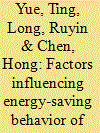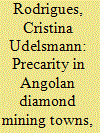|
|
|
Sort Order |
|
|
|
Items / Page
|
|
|
|
|
|
|
| Srl | Item |
| 1 |
ID:
116529


|
|
|
|
|
| Publication |
2012.
|
| Summary/Abstract |
The nutritional impacts of rising food prices on urban households across income classes are assessed using the 2004 NBS urban household survey data for Jiangsu province of China. Empirical results from this study suggest that the across-the-board food price increase is expected to have a substantial adverse impact on nutritional well-being of urban households and in particular, the poor. Moreover, an increase in the price of food grains alone will have the largest adverse impact on calorie and protein intakes, whereas an increase in price of oils and fats only will induce the largest reduction in fat intake.
|
|
|
|
|
|
|
|
|
|
|
|
|
|
|
|
| 2 |
ID:
125762


|
|
|
|
|
| Publication |
2013.
|
| Summary/Abstract |
In this research, the willingness of households to adopt different energy-saving behavior has been analyzed, and factors influencing energy-saving behavior in Jiangsu Province, China, have been examined. The study builds on a broad and practical conceptual framework that embraces three types of energy-saving behavior and four dimensions of influencing factors, including socio-demographics, energy-saving awareness, behavioral ability, and situational factors. The empirical results are based on an Internet survey that was sent out to 638 households. The results indicate that socio-demographic characteristics, including age, gender, income level, household structure, and educational background, are all important factors influencing energy-saving behavior. At present, respondents adopt the usage-reduction type of behavior more often than the other two types, which require a greater capacity to pay for energy-efficient products and a higher level of energy-saving awareness. Situational factors have significant positive moderating effects when the variables of behavioral ability and energy-saving awareness act on energy-saving behavior. In addition, the results also show that spatial differences exist among the three regions of Jiangsu Province. Finally, some implications of these results for the design of future incentive policies and measures to encourage energy-saving behavior are presented.
|
|
|
|
|
|
|
|
|
|
|
|
|
|
|
|
| 3 |
ID:
158481


|
|
|
|
|
| Summary/Abstract |
After nearly 30 years of civil war, Angola gained peace in 2002. The country's diamond and oil wealth affords the national government the means to pursue economic reconstruction and urban development. However, in the diamond-producing region of Lunda Sul, where intense fighting between MPLA and UNITA forces was waged, the legacy of war lingers on in the form of livelihood uncertainty and uneven access to the benefits of the state's urban development programmes. There are three main interactive agents of urban change: the Angolan state, the mining corporations, and not least urban residents. The period has been one of shifting alignments of responsibility for urban housing, livelihoods and welfare provisioning. Beyond the pressures of post-war adjustment, the wider context of global capital investment and labour market restructuring has introduced a new surge of corporate mining investment and differentiated patterns of prosperity and precarity in Lunda Sul.
|
|
|
|
|
|
|
|
|
|
|
|
|
|
|
|
|
|
|
|
|